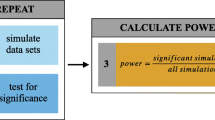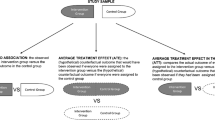Abstract
A general model for the randomized response (RR) method was introduced by Warner (J. Am. Stat. Assoc. 60:63–69, 1965) when a single-sensitive question is under study. However, since social surveys are often based on questionnaires containing more than one sensitive question, the analysis of multiple RR data is of considerable interest. In multivariate stratified surveys with multiple RR data the choice of optimum sample sizes from various strata may be viewed as a multiobjective nonlinear programming problem. The allocation thus obtained may be called a “compromise allocation” in sampling literature. This paper deals with the two-stage stratified Warner’s RR model applied to multiple sensitive questions. The problems of obtaining compromise allocations are formulated as multi-objective integer non linear programming problems with linear and quadratic cost functions as two separate problems. The solution to the formulated problems are achieved through goal programming technique. Numerical examples are presented to illustrate the computational details.
Similar content being viewed by others
References
Beardwood, J., Halton, J.H., Hammersley, J.M.: The shortest path through many points. Proc. Camb. Philos. Soc. 55, 299–327 (1959)
Chang, H.J., Huang, K.C.: Estimation of proportion of a qualitative character. Metrika 53, 269–280 (2001)
Chaudhuri, A., Mukerjee, R.: Randomized Response: Theory and Techniques. Marcel Dekker, New York (1988)
Chaudhuri, A.: Using randomized response from a complex survey to estimate a sensitive proportion in a dichotomous finite population. J. Stat. Plann. Inference 94, 37–42 (2001)
Chaudhuri, A., Saha, A.: Optional versus compulsory randomized response techniques in complex survey. J. Stat. Plann. Inference 135, 516–527 (2005)
Chua, T.C., Tsui, A.K.: Procuring honest responses indirectly. J. Stat. Plann. Inference 90, 107–116 (2000)
Cochran, W.G.: Sampling Techniques, 3rd edn. Wiley, New York (1977)
Diana, G., Perri, P.F.: Estimating a sensitive proportion through randomized response procedures based on auxiliary information. Stat. Pap. 50, 661–672 (2009)
Franklin, L.A.: A comparison of estimators for randomized response sampling with continuous distributions from a dichotomous population. Commun. Stat. Theory Methods 18, 489–505 (1989)
Greenberg, B.G.Abul-Ela, Abdel-Latif, A., Simmons, W.R., Horvitz, D.G.: The unrelated question RR model theoretical frame-work. J. Am. Stat. Assoc. 64, 529–539 (1969)
Huang, K.C.: Estimation of sensitive data from a dichotomous population. Stat. Pap. 47, 149–156 (2006)
Hong, K., Yum, J., Lee, H.: A stratified randomized response technique. Korean J. Appl. Stat. 7, 141–147 (1994)
Horvitz, D.G., Shah, B.V., Simmons, W.R.: The unrelated question randomized response model. Proc. Soc. Stat. Sect. Am. Stat. Assoc. 64, 520–539 (1967)
Kuk, A.Y.C.: Asking sensitive questions indirectly. Biometrika 77, 436–438 (1990)
LINGO User’s Guide (2001) Lindo Systems Inc., 1415 North Dayton Street, Chicago
Mangat, N.S., Singh, R.: An alternative randomized response procedure. Biometrika 77, 439–442 (1990)
Mangat, N.S., Singh, R.: An improved randomized response strategy. J. R. Stat. Soc. B 56(1), 93–95 (1994)
Moors, J.J.A.: Optimization of the unrelated question randomized response model. J. Am. Stat. Assoc. 66, 627–629 (1971)
Padmawar, V.R., Vijayan, K.: Randomized response revisited. J. Stat. Plann. Inference 90, 293–304 (2000)
Singh, R., Mangat, N.S.: Elements of Survey Sampling. Kluwer Academic Publishers, Dordrecht (1996)
Singh, S.: A new stochastic randomized response model. Metrika 56, 131–142 (2002)
Singh, S.: Advanced Sampling Theory with Applications. Kluwer, Dordrecht (2003)
Warner, S.L.: Randomized response—a survey technique for eliminating evasive bias. J. Am. Stat. Assoc. 60, 63–69 (1965)
Acknowledgments
The authors are grateful to the Editor and the Reviewers for their valuable comments and suggestions that helped in improving the manuscript in its present form.
Author information
Authors and Affiliations
Corresponding author
Rights and permissions
About this article
Cite this article
Ghufran, S., Khowaja, S. & Ahsan, M.J. Compromise allocation in multivariate stratified sample surveys under two stage randomized response model. Optim Lett 8, 343–357 (2014). https://doi.org/10.1007/s11590-012-0581-6
Received:
Accepted:
Published:
Issue Date:
DOI: https://doi.org/10.1007/s11590-012-0581-6
Keywords
- Compromise allocation
- Multiple sensitive questions
- Stratified random sampling
- Two-stage randomized response technique




